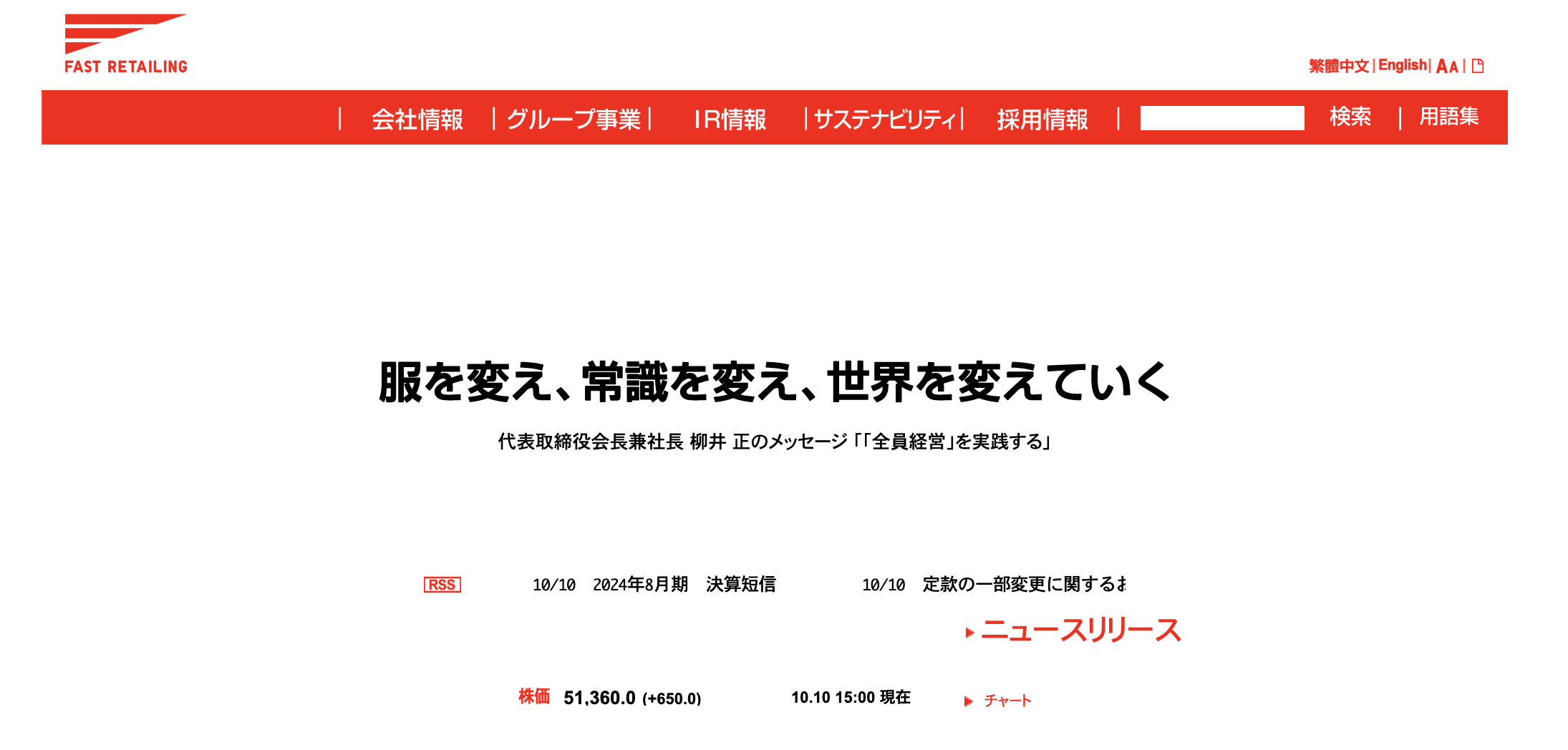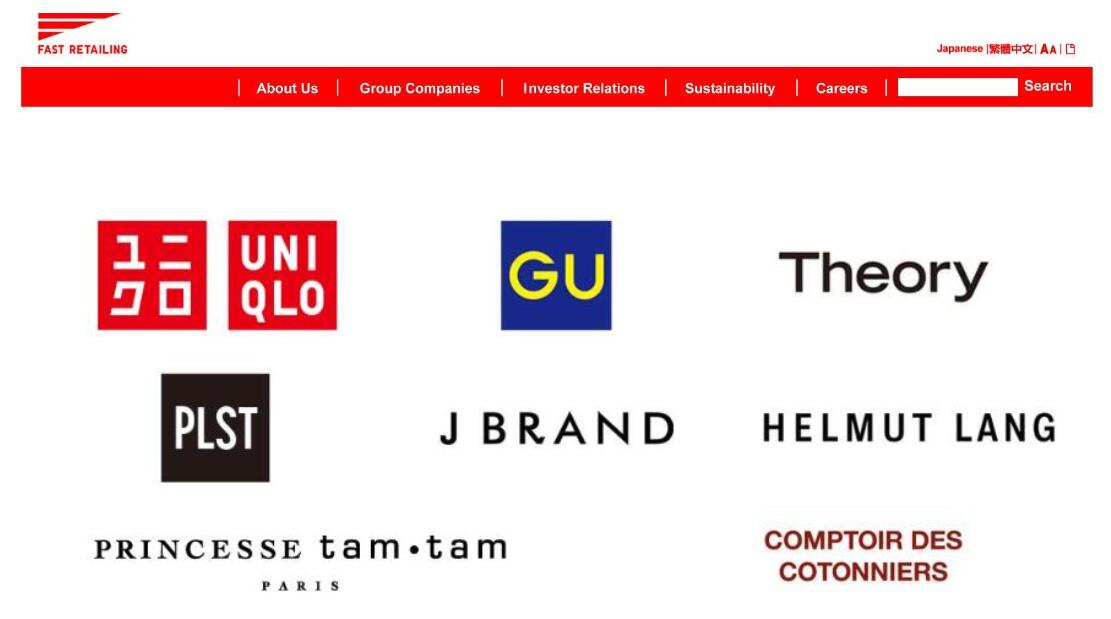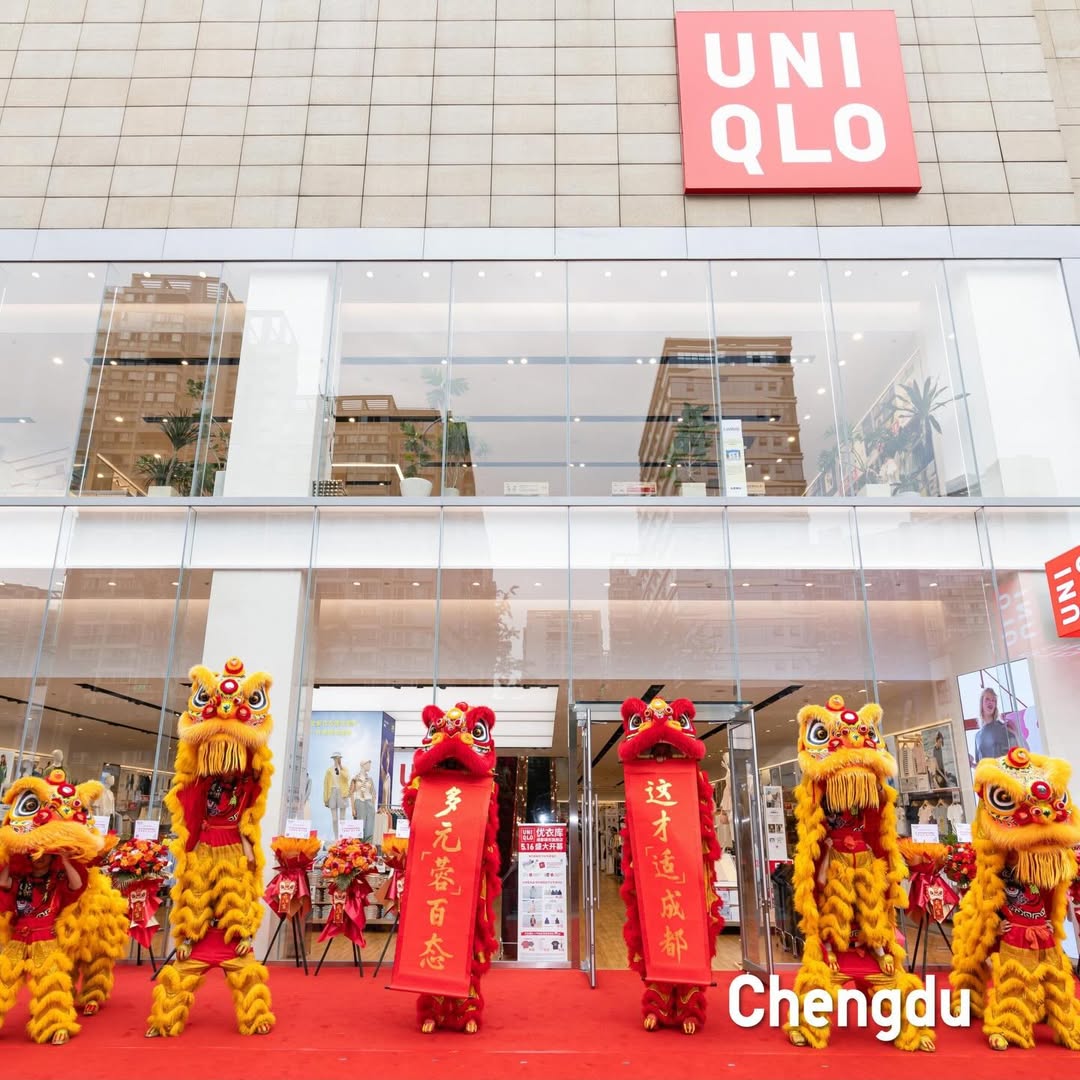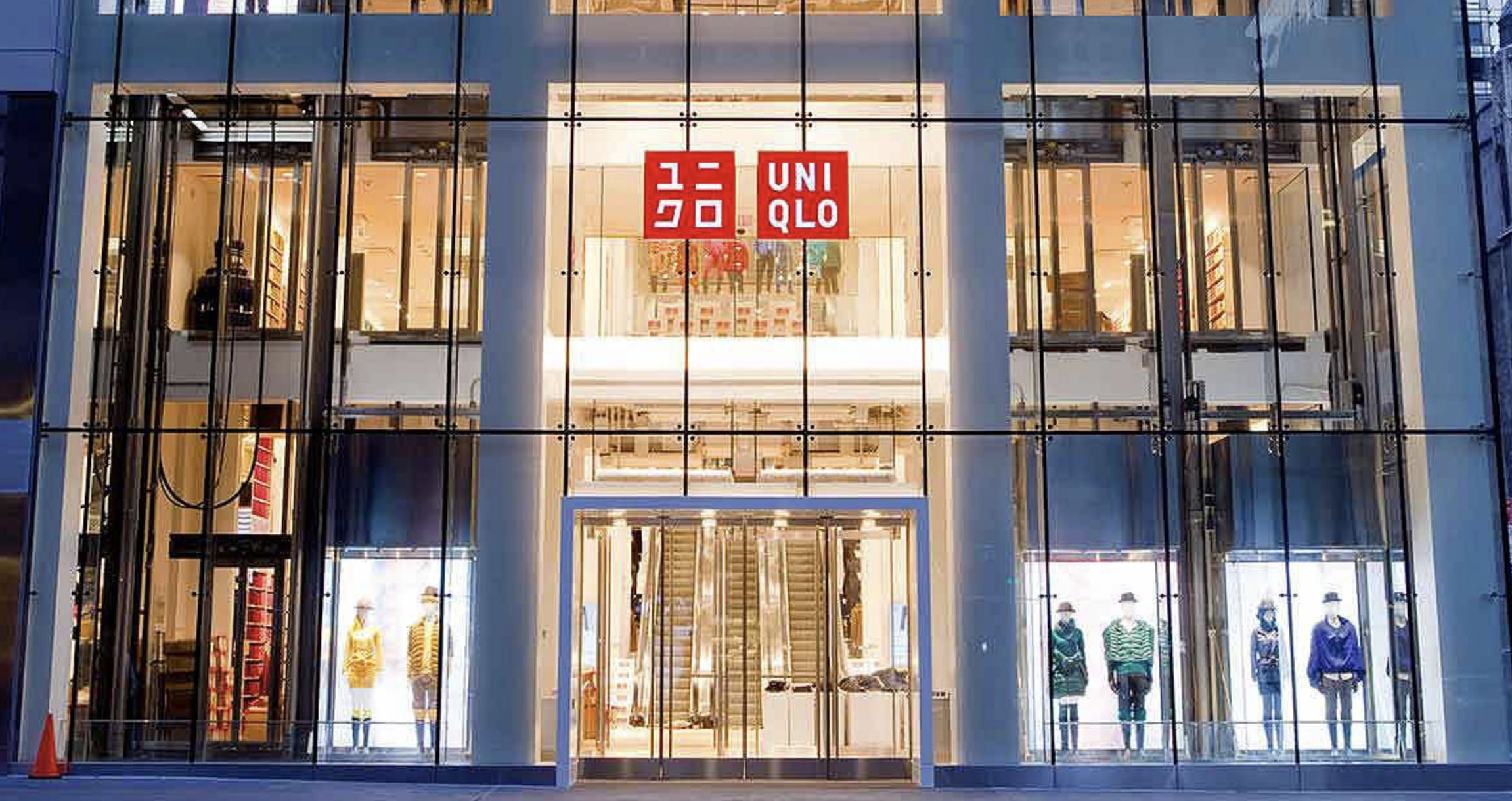On October 10, Fast Retailing, the parent company of Uniqlo, released its consolidated financial results for the fiscal year ending August 31, 2024. The company reported substantial growth in both revenue and operating profit, reaching record highs. In the context of accelerating diversification of revenue pillars, the group further strengthened its profitability in the global market.
Total revenue for the year amounted to JPY 3.1038 trillion, reflecting a 12.2% year-on-year increase. Operating profit totaled JPY 500.9 billion, a 31.4% rise year-on-year, while pre-tax profit reached JPY 557.2 billion (up 27.2%), and net profit attributable to shareholders grew by 25.6% to JPY 371.9 billion.

For fiscal year 2024, the group’s capital expenditures totaled JPY 112.1 billion, an increase of JPY 10.1 billion from the previous year. This included JPY 12 billion invested in Uniqlo Japan, JPY 57.6 billion for Uniqlo International, JPY 6.7 billion for the GU segment, JPY 1.6 billion for the global brands segment, and JPY 33.9 billion for systems and related investments. In addition to investments in new stores, Fast Retailing continued to invest in automated warehousing, building a strong foundation for its global expansion.
In the financial report, Fast Retailing expressed its ambition to become the “world’s No. 1 brand,” trusted by customers globally and indispensable in daily life. To achieve this, the group aims to:
- Invest in human capital to develop managerial talent;
- Pursue sustainable business models;
- Further advance its vision of becoming a “digital consumer retail company”;
- Diversify global revenue pillars;
- Expand the GU business and global brand segment, including brands like Theory. For its overseas Uniqlo business, Fast Retailing emphasized its commitment to developing high-quality stores, enhancing product development, and strengthening brand building.
Additionally, the group’s “LifeWear” concept will continue to play a key role in creating a sustainable society, focusing on producing high-quality, durable clothing with minimal environmental impact, ensuring safe labor conditions, and promoting clothing recyclability.
As of the close of trading on October 10, Fast Retailing’s stock price on the Tokyo Stock Exchange rose by 1.28% to JPY 51,360 per share, with a market capitalization of approximately JPY 15.75 trillion. Over the past 12 months, the company’s stock has gained 57.16%.
By Segment:
Uniqlo Japan
In FY2024, Uniqlo Japan saw strong growth in both revenue and operating profit, achieving record results. Revenue reached JPY 932.2 billion (up 4.7% year-on-year), and operating profit was JPY 155.8 billion (up 32.2%).
Same-store sales, including online sales, increased by 3.2% year-on-year. While sales fell by 3.4% in the first half due to a warm winter, they rebounded by 11.7% in the second half, driven by effective inventory strategies and enhanced marketing efforts. Uniqlo’s growing global recognition, particularly among inbound tourists, also contributed to the strong performance.
The gross profit margin improved by 2.9 percentage points year-on-year, benefiting from flexible production control, reduced exchange rate impacts, and lower discounting in the second half. Additionally, the ratio of personnel and advertising expenses to revenue decreased, leading to a 0.5 percentage point improvement in the SG&A ratio.

Overseas UNIQLO
In FY2024, the overseas UNIQLO business segment achieved significant growth in both revenue and operating profit, reaching record highs. Total revenue amounted to JPY 1.7118 trillion, reflecting a 19.1% year-on-year increase, while operating profit rose to JPY 283.4 billion, up 24.9% year-on-year. Notably, operating profit margins in North America and Europe improved significantly, with all regions achieving margins above 15%.
By region:
- In the Greater China market, full-year revenue reached JPY 677 billion (up 9.2% year-on-year), while operating profit grew slightly by 0.5% to JPY 104.8 billion. Despite revenue growth in the Chinese Mainland and Hong Kong, operating profit declined due to weak consumer demand, unfavorable weather, and product misalignment in the second half, which led to a decline in revenue and a sharp reduction in profit. In contrast, the Taiwan market saw growth in both revenue and profit.
- In South Korea, Southeast Asia, India, and Australia, full-year revenue reached JPY 540.5 billion (up 20.2% year-on-year), with operating profit at JPY 97.6 billion (up 24.8%). Sales of key products like HEATTECH innerwear, fleece, BRATOPS, and UV protection jackets contributed to strong growth. Both revenue and operating profit increased significantly across these markets.
- In North America, full-year revenue surged to JPY 217.7 billion (up 32.8% year-on-year), with operating profit soaring by 65.1% to JPY 34.8 billion. The brand’s focus on core products and intensified marketing efforts drove strong same-store sales growth.
- In Europe, full-year revenue rose to JPY 276.5 billion (up 44.5% year-on-year), with operating profit increasing by 70.1% to JPY 46.5 billion. New store sales performed exceptionally well, and same-store sales also achieved double-digit growth.
GU Segment
In FY2024, the GU segment recorded revenue growth and a sharp increase in profit. Total revenue reached JPY 319.1 billion (up 8.1% year-on-year), and operating profit grew by 28.9% to JPY 33.7 billion. Strong sales of trendy items, such as Heavy Weight sweatshirts, sweatshirt-style T-shirts, and Barrel Leg jeans, boosted same-store sales. Additionally, sales to inbound tourists contributed to revenue growth. Cost improvements also led to higher gross margins, driving the increase in operating profit.

Global Brands
For FY2024, the global brands segment saw a decline in revenue, totaling JPY 138.8 billion (down 2.0% year-on-year). The segment’s operating profit, reflecting the essence of its performance, fell by 76.2% to JPY 100 million. These declines were mainly due to store closures and restructuring in the PLST and Comptoir des Cotonniers businesses, as well as weak sales in the Theory business.
However, the global brands segment achieved a turnaround in operating profit, reaching JPY 600 million, compared to a JPY 3 billion loss in the previous year, which had been impacted by impairment losses from store closures.
By business unit:
- Theory business saw a decline in revenue, primarily due to weak sales in the U.S. and challenges in Asia amid low consumer confidence.
- PLST business experienced a significant decline in revenue due to store closures, though same-store sales returned to growth. The brand’s shift away from discount-driven strategies led to a marked improvement in gross margins, with operating profit returning to positive territory.
- Comptoir des Cotonniers business saw a sharp drop in revenue due to a reduction in store numbers. However, cost improvements from restructuring efforts helped narrow losses.
Outlook
Fast Retailing projects total revenue for FY2025 to reach JPY 3.4 trillion (up 9.5%), with operating profit expected to grow by 5.8% to JPY 530 billion, pre-tax profit by 5.0% to JPY 585 billion, and net profit attributable to shareholders by 3.5% to JPY 385 billion.
By business segment, revenue and operating profit are expected to grow in both the Japan and overseas UNIQLO operations, with significant growth projected for the GU and global brands segments. The group also plans to continue its global expansion.
In terms of store count, Fast Retailing expects that by the end of August 2025, UNIQLO Japan will have 797 stores (including franchise locations), UNIQLO International will have 1,778 stores, GU will have 489 stores, and global brands will have 634 stores, bringing the total store count across all business segments to 3,698.
|Source: Fast Retailing official website and financial reports
|Image Credit: Fast Retailing official website
|Editor: LeZhi



